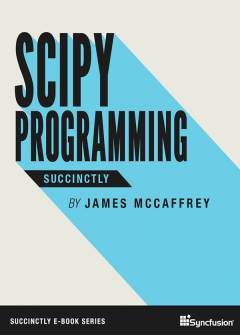
|
FreeComputerBooks.com
Links to Free Computer, Mathematics, Technical Books all over the World
|
|
- Title SciPy Programming Succinctly
- Author(s) James McCaffrey
- Publisher: Syncfusion (2016)
- Hardcover/Paperback N/A
- eBook HTML, PDF (120 pages), ePub, adn MOBI (Kindle)
- Language: English
- ISBN-10: N/A
- ISBN-13: N/A
- Share This:

|
This book offers readers a quick, thorough grounding in knowledge of the Python open source extension SciPy. The SciPy library, accompanied by its interdependent NumPy, offers Python programmers advanced functions that work with arrays and matrices.
Each section presents a complete demo program for programmers to experiment with, carefully chosen examples to best illustrate each function, and resources for further learning. Use this e-book to install and edit SciPy, and use arrays, matrices, and combinatorics in Python programming.
About the Authors- N/A
 Similar Books:
Similar Books:
-
 Scipy Lecture Notes (Emmanuelle Gouillart, et al)
Scipy Lecture Notes (Emmanuelle Gouillart, et al)
This book teaches the scientific Python ecosystem, a quick introduction to central tools and techniques. It is for programmers from beginner to expert. Work on real-world problems with SciPy, NumPy, Pandas, scikit-image, and other Python libraries.
-
 Programming for Computations - Python 3 Edition
Programming for Computations - Python 3 Edition
This book outlines the shortest possible path from no previous experience with programming to a set of skills that allows students to write simple programs for solving common mathematical problems with numerical methods in the context.
-
 Solving PDEs in Python: The FEniCS Tutorial I (H. Langtangen)
Solving PDEs in Python: The FEniCS Tutorial I (H. Langtangen)
This book offers a concise and gentle introduction to finite element programming in Python based on the popular FEniCS software library. Using a series of examples, it guides readers through the essential steps to quickly solving a PDE in FEniCS.
-
 From Python to NumPy (Nicolas P. Rougier)
From Python to NumPy (Nicolas P. Rougier)
NumPy is one of the most important scientific computing libraries available for Python. This book teaches you how to achieve expert level competency to perform complex operations, with in-depth coverage of advanced concepts.
-
 Guide to NumPy (Travis E. Oliphant)
Guide to NumPy (Travis E. Oliphant)
This book is for programmers, scientists, or engineers, who have basic Python knowledge and would like to be able to do numerical computations with Python. It will give you a solid foundation in NumPy arrays and universal functions.
-
 NumPy Tutorials (Usman Malik, Anne Bonner, et al)
NumPy Tutorials (Usman Malik, Anne Bonner, et al)
They provide everything you need to know to get started with NumPy. They also explain the basics of NumPy such as its architecture and environment, discusses the various array functions, types of indexing, etc. With examples for better understanding.
-
 Introduction to Scientific Programming with Python
Introduction to Scientific Programming with Python
This book offers an initial introduction to programming for scientific and computational applications using the Python programming language. The presentation style is compact and example-based, assuming little or no prior experience in programming.
-
 Python Scripting for Computational Science (Hans Langtangen)
Python Scripting for Computational Science (Hans Langtangen)
With a primary focus on examples and applications of relevance to computational scientists, this brilliantly useful book shows computational scientists how to develop tailored, flexible, and human-efficient working environments built from small scripts written in the easy-to-learn, high-level Python language.
-
 Computational Physics with Python (Eric Ayars)
Computational Physics with Python (Eric Ayars)
This book provides an unusually broad survey of the topics of modern computational physics. Its philosophy is rooted in learning by doing, with new scientific materials as well as with the Python programming language.





